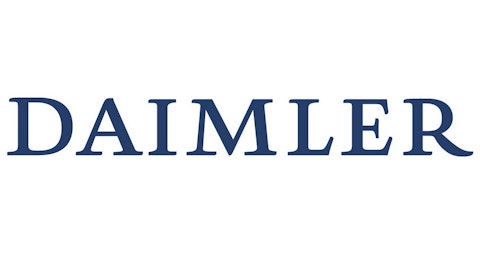
Ford world headquarters. Photo Credit: Ford Motor Company (NYSE:F).
I’ve written many articles regarding Ford Motor Company (NYSE:F)‘s total debt and how it’s often misunderstood. Most of Ford’s total debt belongs to its finance arm, Ford Motor Credit, which takes large loans at low interest rates and dishes them back out to its consumers, making a fair profit. Right now Ford’s debt from automotive operations is $15.8 billion, while its Ford Motor Company (NYSE:F) Credit counterpart owns roughly $90 billion in debt.
As long as you understand that the total debt situation isn’t something to worry about: Ford Motor Company (NYSE:F) has been diligent in paying down its debts. However, there’s a debt problem with Ford that isn’t as visible; its underfunded pension is a larger obligation than its $15.8 billion automotive debt. There’s good news, though – it’s an improving situation, and here’s what it means for investors.

Ford Motor Company (NYSE:F)’s pension obligation is a complicated issue with many variables. In its simplest form, it comes down to whether discount rates are rising or falling. If discount rates sink lower then it forces Ford to increase what it is obligated to have in its pension fund. Discount rates have been sitting at low levels and that has caused Ford Motor Company (NYSE:F)’s pension obligation to rise quickly. Ford has put billions into its fund over the last couple years but it hasn’t been enough to keep up with soaring obligations, leaving the pension plan underfunded by $18.7 billion at the end of 2012.
As rates sat low, Ford Motor Company (NYSE:F) stepped up the payments into its funds from $1.1 billion in 2011 to $3.4 billion in 2012, and it has $5 billion planned for this year. That’s a large chunk of change to be putting into the pension fund, especially when you consider it almost equals Ford’s trailing-12-month net income of $5.8 billion.
Fortunately, for those investors worried about the underfunded pension, good news has arrived: the discount rates are rising. According to Ford’s second-quarter presentation: “Strategic actions and recent increase in discount rates significantly improved funded status as of June 30 compared with Year-End 2012.”
As rates continue to improve, and Ford continues to make large contributions, it will lead to a healthy and fully funded pension plan – enabling Ford to spend those billions of dollars on other developments.
“We won’t have to allocate as much capital to pensions as we have the last couple of years and certainly this year,” Bob Shanks, Ford’s CFO, said during Ford’s second-quarter conference call, according to Automotive News. “That will give us the ability to take the cash that we’re generating and invest it in other parts of the business that can support further growth.”
One opportunity for that cash could be in initiating a share buyback plan to undo some of the share dilution Ford has witnessed over the years. That cash could be used to increase the dividend to shareholders, or simply to pushed into research and development to continue its success in the U.S. market or speed up its progress in China – all worthy situations for billions of extra dollars.
Bottom line
As with any large company and public stock, there are many things hanging over Ford’s share price. That’s what I love about owning Ford; I have full faith in its management to tackle these problems and solve them one at a time, rewarding long-term shareholders who witness the improved profitability. Ford is aiming for a fully funded pension by mid-decade. That’s the same year that management plans to be breaking even in Europe – two developments that could vastly improve Ford’s bottom line profitability and cash flow.
The article Ford’s Hidden Debt Problem originally appeared on Fool.com and is written by Daniel Miller.
Fool contributor Daniel Miller owns shares of Ford. The Motley Fool recommends Ford. The Motley Fool owns shares of Ford.
Copyright © 1995 – 2013 The Motley Fool, LLC. All rights reserved. The Motley Fool has a disclosure policy.


